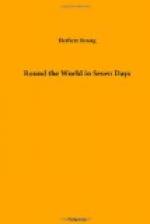Then the merchant and the official began to wrangle. For some minutes Callard in vain tried to get a word in edgeways; then at last the Councillor, pushing back his fez with an air of weary patience, turned to the newcomers and asked their business. A few words sufficed; the Councillor rang a bell on the table, and when his secretary appeared, ordered him to make out a laissez-passer for Lieutenant Smith for all the Custom Houses of the Empire. This done, he turned once more to listen to the interminable dispute about the left-hand gloves.
“We are doing well,” said Callard, as the two left the Custom House. “There’s still nearly an hour to spare. Now for the petrol.”
They drove across the Galata bridge to the district of Kourshounlou Han, and found that Benzonana had had the petrol ready at early morning, and, what was more, had it at that moment in a conveyance for transport. Johnson asked him if he had received any addresses from London, and the man handed him a folded paper. Then, asking him to send the petrol and some machine oil at once to the Ok Meidan, the two Englishmen reentered their carriage, dashed up the Maltese Street, past the Bank and the Economic Stores, up the Municipality Hill, and again down by a short cut to the Admiralty. It was an hour and a half since Johnson had set forth on his errand.
They found Smith and Rodier talking to the second golfer, boiling coffee in a little portable stove, and eating a kind of shortbread they had purchased of one of the simitdjis or itinerant vendors of that article who had been doing a roaring trade with the children, and even the elders, among the sightseers.
“Don’t taste bad, spread with Bovril,” said Smith, as Johnson and Callard alighted from their carriage.
The crowd had grown to immense proportions. Smith said they had been clamouring ever since Johnson had been gone, and he would rather like to know what they said.
“Probably discussing whether the Commander of the Faithful won’t order you to be flung into the Bosphorus,” said Callard.
The soldiers were still on guard round the aeroplane. Johnson approached the captain and showed him the Minister of War’s order. Almost at the same moment an aide-de-camp came galloping up from the Minister himself to assure the officer that all was right.
“But don’t go yet, captain,” said Johnson anxiously. “My friend will require a clear space for starting his aeroplane, and without your men we shall never get the crowd back.”
The officer agreed to wait until the Englishman departed, and Johnson returned to Smith to give him the paper he had received from Benzonana. Callard had already related their experiences at the Ministry of War and the Custom House.
“But what about the petrol?” asked Smith. “Time’s getting on.”
“He said he had it all ready to send. Ah! I guess this is it coming.”
A way was parted through the crowd, and there came up with great rattling and creaking a heavy motor omnibus of the type that first appeared on the streets of London. It was crowded within and without with Turks young and old.




